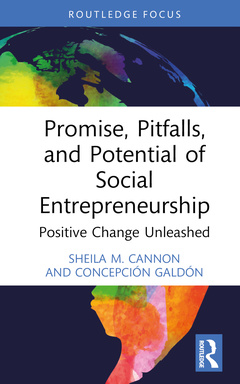Description
Promise, Pitfalls, and Potential of Social Entrepreneurship
Positive Change Unleashed
Routledge COBS Focus on Responsible Business Series
Authors: Cannon Sheila, Galdón Concepción
Language: English
Subjects for Promise, Pitfalls, and Potential of Social Entrepreneurship:
61.25 €
In Print (Delivery period: 14 days).
Add to cart· 13.8x21.6 cm · Hardback
Description
/li>Contents
/li>Readership
/li>Biography
/li>
This book dives into the heart of social entrepreneurship as the authors share the latest research, global experiences, authentic private conversations, and diverse narratives around this widely popular concept.
The idea and practice of social entrepreneurship has swept the world, taken up with enthusiasm by business leaders, nonprofit practitioners, and public policy makers alike. In this book, the authors argue that social entrepreneurship is surrounded by great promise, and that this high expectation has contributed to its pitfalls, setting it out as separate and different from other kinds of nonprofit organising, public service provision, and business for social benefit. After exploring the problem of inflated expectations, the authors rescue the concept from perfection ? overly positive normative judgements ? by presenting practical ways forward.
The book sets out how to really unleash the power of social entrepreneurship so that it can actually deliver on its promise to improve how we organise for social purpose. This potential revolves around four key themes that are levers for social change: innovative individuals, social impact, scaling social enterprises, and the power of ecosystems. Through these themes, the book covers a wide range of approaches to social enterprise illustrated by specific examples and experiences from five continents.
This accessible book is a valuable resource for a variety of practitioners, upper-level students, instructors, and business scholars, particularly those with an interest in social/environmental impact, entrepreneurship, business ethics, sustainable business, ESG and CSR.
Introduction
Part 1. The Promise
Chapter 1: The Historical Emergence of Social Enterprise
Chapter 2: How Every Sector Got So Excited about Social Enterprise: The Four Failure Theory
Chapter 3: Levers of Positive Change
Part 2. The Pitfalls
Chapter 4: Social Entrepreneurship beyond Heroism: Managing Self and Others under Emotional Stress
Chapter 5: Impact – the Trend, the Pressure, and the Reality of Social Change
Chapter 6: Scaling Wisely: Making Choices That Prioritise Impact
Chapter 7: Ecosystems, Somewhat Unstitched
Part 3. The Potential
Chapter 8: Social Value Creators: Accepting Vulnerability and Nurturing Well-Being for Impact
Chapter 9: From Reporting to Revolution: Choosing Your Social Impact Lens
Chapter 10: Scaling Creatively: Thinking Outside the Toolbox
Chapter 11: Bringing Ecosystems Together
Conclusion: The Real Promise, as We See It
Sheila Cannon is Assistant Professor in Social Entrepreneurship at Trinity Business School, Trinity College Dublin, Ireland. She is Director of Engagement at the Trinity Centre for Social Innovation. She publishes research on and teaches about the third sector including social enterprises, nonprofits, and civil society organisations. Her research contributes to knowledge on how organisations influence and respond to sociocultural change. She worked in peacebuilding for 12 years in southeast Europe and Northern Ireland and is chair of the board of the social enterprise, Shuttle Knit. She has a bachelor’s degree in Ancient Greek from Vassar College, New York.
Concepción Galdón is IE Business School’s Vice-Dean for Business with Purpose and Director of IE Foundation’s Center for Social Innovation and Sustainability. Concepción teaches sustainable business, social entrepreneurship, and sustainable innovation and technology. Concepción is also president of the social venture Puentes Global, which she co-founded in 2009 and has collaborated in several civil society initiatives aimed at fostering business with purpose. Concepción is an economist at Universidad Autónoma de Madrid. She holds a Master in Public Administration and International Development from Harvard Kennedy School and a PhD in International Economy and Development from Universidad Complutense de Madrid.

